| Listing 1 - 10 of 33 | << page >> |
Sort by
|

ISBN: 9780387400549 9780387400501 0387400508 0387400540 9786611148102 1281148105 Year: 2007 Volume: 189 Publisher: New York, NY Springer Science+Business Media, LLC
Abstract | Keywords | Export | Availability | Bookmark
 Loading...
Loading...Choose an application
- Reference Manager
- EndNote
- RefWorks (Direct export to RefWorks)
The purpose of this book is to discuss whether statistical methods make sense. That is a fair question, at the heart of the statistician-client relationship, but put so boldly it may arouse anger. The many books entitled something like Foundations of Statistics avoid controversy by merely describing the various methods without explaining why certain conclusions may be drawn from certain data. But we statisticians need a better answer then just shouting a little louder. To avoid a duel, we prejudge the issue and ask the narrower question: "In what sense do statistical methods provide scientific evidence?" The present volume begins the task of providing interpretations and explanations of several theories of statistical evidence. It should be relevant to anyone interested in the logic of experimental science. Have we achieved a true Foundation of Statistics? We have made the link with one widely accepted view of science and we have explained the senses in which Bayesian statistics and p-values allow us to draw conclusions. Bill Thompson is Professor emeritus of Statistics at the University of Missouri-Columbia. He has had practical affiliations with the National Bureau of Standards, E.I. Dupont, the U.S. Army Air Defense Board, and Oak Ridge National Laboratories. He is a fellow of the American Statistical Association and has served as associate editor of the journal of that society. He has authored the book Applied Probability.
statistisch onderzoek --- Statistical science --- Mathematical statistics --- Statistique mathématique --- EPUB-LIV-FT LIVSTATI SPRINGER-B --- Mathematical statistics. --- Statistical Theory and Methods. --- Mathematics --- Statistical inference --- Statistics, Mathematical --- Statistics --- Probabilities --- Sampling (Statistics) --- Statistical methods --- Statistics . --- Statistical analysis --- Statistical data --- Econometrics
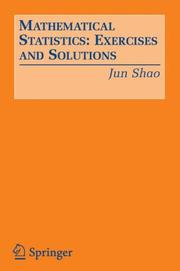
ISBN: 0387249702 9780387249704 9786610612079 128061207X 0387282769 Year: 2005 Publisher: New York : Springer,
Abstract | Keywords | Export | Availability | Bookmark
 Loading...
Loading...Choose an application
- Reference Manager
- EndNote
- RefWorks (Direct export to RefWorks)
This book consists of four hundred exercises in mathematical statistics and their solutions, over 95% of which are in the author's Mathematical Statistics, Second Edition (Springer, 2003). For students preparing for work on a Ph.D. degree in statistics and instructors of mathematical statistics courses, this useful book provides solutions to train students for their research ability in mathematical statistics and presents many additional results and examples that complement any text in mathematical statistics. To develop problem-solving skills, two solutions and/or notes of brief discussions accompany a few exercises. The exercises are grouped into seven chapters with titles matching those in the author's Mathematical Statistics. On the other hand, the book is stand-alone because exercises and solutions are comprehensible independently of their source, and notation and terminology are explained in the front of the book. Readers are assumed to have a good knowledge in advanced calculus. A course in real analysis or measure theory is highly recommended. If this book is used with a statistics textbook that does not include probability theory, then knowledge in measure-theoretic probability theory is required. Jun Shao is Professor of Statistics at the University of Wisconsin, Madison.
Mathematical statistics --- Statistique mathématique --- Problems, exercises, etc. --- Problèmes et exercices --- Mathematical statistics. --- Mathematical statistics - Problems, exercises, etc. --- Mathematics --- Physical Sciences & Mathematics --- Mathematical Statistics --- Statistics --- Statistique mathématique --- Problèmes et exercices --- EPUB-LIV-FT LIVSTATI SPRINGER-B --- Statistics. --- Statistical Theory and Methods. --- Statistical inference --- Statistics, Mathematical --- Probabilities --- Sampling (Statistics) --- Statistical methods --- Statistics . --- Statistical analysis --- Statistical data --- Statistical science --- Econometrics
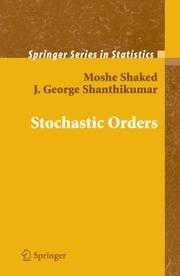
ISBN: 0387329153 9780387329154 1441921958 9786610816279 1280816279 0387346759 Year: 2007 Publisher: New York : Springer,
Abstract | Keywords | Export | Availability | Bookmark
 Loading...
Loading...Choose an application
- Reference Manager
- EndNote
- RefWorks (Direct export to RefWorks)
Stochastic ordering is a fundamental guide for decision making under uncertainty. It is also an essential tool in the study of structural properties of complex stochastic systems. This reference text presents a comprehensive coverage of the various notions of stochastic orderings, their closure properties, and their applications. Some of these orderings are routinely used in many applications in economics, finance, insurance, management science, operations research, statistics, and various other fields of study. And the value of the other notions of stochastic orderings still needs to be explored further. This book is an ideal reference for anyone interested in decision making under uncertainty and interested in the analysis of complex stochastic systems. It is suitable as a text for advanced graduate course on stochastic ordering and applications. Moshe Shaked is Professor of Mathematics at the University of Arizona, Tucson, AZ. He has made several fundamental contributions to the development of stochastic ordering and stochastic convexity, with applications in reliability theory and economics. He has published over 150 papers in this and related areas. J. George Shanthikumar is Professor of Industrial Engineering and Operations Research at the University of California, Berkeley, CA. He has made fundamental contributions to the application of stochastic ordering and stochastic convexity to queueing and related problems that arise in operations research and management science. He has published over 250 papers in this and related fields.
Stochastic processes --- Stochastic orders --- Ordres stochastiques --- Stochastic orders. --- Mathematics --- Physical Sciences & Mathematics --- Mathematical Statistics --- 519.2 --- Orderings, Stochastic --- Orders, Stochastic --- Stochastic orderings --- Distribution (Probability theory) --- EPUB-LIV-FT LIVSTATI SPRINGER-B --- Statistics. --- Statistical Theory and Methods. --- Mathematical statistics. --- Statistical inference --- Statistics, Mathematical --- Statistics --- Probabilities --- Sampling (Statistics) --- Statistical methods --- Statistics . --- Statistical analysis --- Statistical data --- Statistical science --- Econometrics

ISBN: 9780387308654 0387308652 9786610716234 1280716231 0387342397 Year: 2006 Publisher: New York, N.Y. : Springer,
Abstract | Keywords | Export | Availability | Bookmark
 Loading...
Loading...Choose an application
- Reference Manager
- EndNote
- RefWorks (Direct export to RefWorks)
Twenty-?ve years have passed since the publication of the Russian version of the book Estimation of Dependencies Based on Empirical Data (EDBED for short). Twen- ?ve years is a long period of time. During these years many things have happened. Looking back, one can see how rapidly life and technology have changed, and how slow and dif?cult it is to change the theoretical foundation of the technology and its philosophy. I pursued two goals writing this Afterword: to update the technical results presented in EDBED (the easy goal) and to describe a general picture of how the new ideas developed over these years (a much more dif?cult goal). The picture which I would like to present is a very personal (and therefore very biased) account of the development of one particular branch of science, Empirical - ference Science. Such accounts usually are not included in the content of technical publications. I have followed this rule in all of my previous books. But this time I would like to violate it for the following reasons. First of all, for me EDBED is the important milestone in the development of empirical inference theory and I would like to explain why. S- ond, during these years, there were a lot of discussions between supporters of the new 1 paradigm (now it is called the VC theory ) and the old one (classical statistics).
Estimation theory. --- Théorie de l'estimation --- Estimation theory --- Mathematical Statistics --- Computer Science --- Mechanical Engineering - General --- Mechanical Engineering --- Engineering & Applied Sciences --- Mathematics --- Physical Sciences & Mathematics --- Information Technology --- Artificial Intelligence --- Théorie de l'estimation --- EPUB-LIV-FT LIVSTATI SPRINGER-B --- Estimating techniques --- Mathematics. --- Applied mathematics. --- Engineering mathematics. --- Applications of Mathematics. --- Least squares --- Mathematical statistics --- Stochastic processes --- Math --- Science
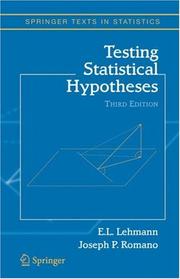
ISBN: 9781441931788 9780387988641 1441931783 0387988645 038727605X Year: 2005 Publisher: New York : Springer,
Abstract | Keywords | Export | Availability | Bookmark
 Loading...
Loading...Choose an application
- Reference Manager
- EndNote
- RefWorks (Direct export to RefWorks)
The third edition of Testing Statistical Hypotheses updates and expands upon the classic graduate text, emphasizing optimality theory for hypothesis testing and confidence sets. The principal additions include a rigorous treatment of large sample optimality, together with the requisite tools. In addition, an introduction to the theory of resampling methods such as the bootstrap is developed. The sections on multiple testing and goodness of fit testing are expanded. The text is suitable for Ph.D. students in statistics and includes over 300 new problems out of a total of more than 760. E.L. Lehmann is Professor of Statistics Emeritus at the University of California, Berkeley. He is a member of the National Academy of Sciences and the American Academy of Arts and Sciences, and the recipient of honorary degrees from the University of Leiden, The Netherlands and the University of Chicago. He is the author of Elements of Large-Sample Theory and (with George Casella) he is also the author of Theory of Point Estimation, Second Edition. Joseph P. Romano is Professor of Statistics at Stanford University. He is a recipient of a Presidential Young Investigator Award and a Fellow of the Institute of Mathematical Statistics. He has coauthored two other books, Subsampling with Dimitris Politis and Michael Wolf, and Counterexamples in Probability and Statistics with Andrew Siegel. .
Statistical hypothesis testing --- Tests d'hypothèses (Statistique) --- Statistical hypothesis testing. --- Mathematical Statistics --- Mathematics --- Physical Sciences & Mathematics --- Tests d'hypothèses (Statistique) --- EPUB-LIV-FT LIVSTATI SPRINGER-B --- Hypothesis testing (Statistics) --- Significance testing (Statistics) --- Statistical significance testing --- Testing statistical hypotheses --- Statistics. --- Statistical Theory and Methods. --- Distribution (Probability theory) --- Hypothesis --- Mathematical statistics
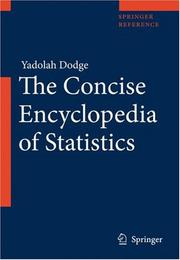
ISBN: 0387328335 0387317422 0387338284 9780387317427 Year: 2008 Publisher: New York, N.Y. : Springer,
Abstract | Keywords | Export | Availability | Bookmark
 Loading...
Loading...Choose an application
- Reference Manager
- EndNote
- RefWorks (Direct export to RefWorks)
The Concise Encyclopedia of Statistics presents the essential information about statistical tests, concepts, and analytical methods in language that is accessible to practitioners and students of the vast community using statistics in medicine, engineering, physical science, life science, social science, and business/economics. The reference is alphabetically arranged to provide quick access to the fundamental tools of statistical methodology and biographies of famous statisticians. The more than 500 entries include definitions, history, mathematical details, limitations, examples, references, and further readings. All entries include cross-references as well as the key citations. The back matter includes a timeline of statistical inventions. This reference will be an enduring resource for locating convenient overviews about this essential field of study. Founder of the Master in Statistics program in 1989 for the University of Neuchâtel in Switzerland, Professor Yadolah Dodge earned his Master in Applied Statistics from the Utah State University in 1970 and his Ph.D. in Statistics with minor in Biometry from the Oregon State University in 1973. He has published numerous articles and authored, co-authored and edited several books including Mathematical Programming in Statistics (John Wiley 1981, Classic Edition 1993), Analysis of Experiments with Missing Data (John Wiley 1985), Alternative Methods of Regression (John Wiley 1993), Premier Pas en Statistique (Springer 1999), Adaptive Regression (2000), The Oxford Dictionary of Statistical Terms (2003), Statistique: Dictionnaire encyclopédique (Springer 2004), and Optimisation appliquée (Springer 2005). Professor Dodge is an elected member of the International Statistical Institute and a Fellow of the Royal Statistical Society.
Statistics --- Statistical analysis --- Statistical data --- Statistical methods --- Statistical science --- Mathematics --- Econometrics --- Statistics. --- Engineering. --- Statistics, general. --- Science, Humanities and Social Sciences, multidisciplinary. --- Engineering, general. --- Construction --- Industrial arts --- Technology --- Statistiques --- Encyclopedias --- Encyclopédies --- EPUB-LIV-FT LIVSTATI SPRINGER-B --- Encyclopedias. --- Statistics . --- Methodology --- History
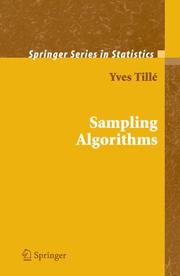
ISBN: 9780387308142 0387308148 1441921559 9786610716227 1280716223 0387342400 Year: 2006 Publisher: New York : Springer,
Abstract | Keywords | Export | Availability | Bookmark
 Loading...
Loading...Choose an application
- Reference Manager
- EndNote
- RefWorks (Direct export to RefWorks)
Over the last few decades, important progresses in the methods of sampling have been achieved. This book draws up an inventory of new methods that can be useful for selecting samples. Forty-six sampling methods are described in the framework of general theory. The algorithms are described rigorously, which allows implementing directly the described methods. This book is aimed at experienced statisticians who are familiar with the theory of survey sampling.Yves Tillé is a professor at the University of Neuchâtel (Switzerland).
Sampling (Statistics) --- Algorithms --- Algorithms. --- Echantillonnage (Statistique) --- Algorithmes --- EPUB-LIV-FT LIVSTATI SPRINGER-B --- Mathematical statistics. --- Statistics. --- Statistical Theory and Methods. --- Statistics and Computing/Statistics Programs. --- Statistics for Social Sciences, Humanities, Law. --- Statistical analysis --- Statistical data --- Statistical methods --- Statistical science --- Mathematics --- Econometrics --- Statistical inference --- Statistics, Mathematical --- Statistics --- Probabilities --- Statistics .
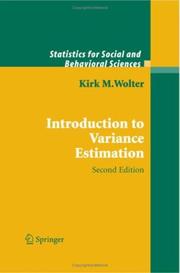
ISBN: 1280970014 9786610970018 0387350993 038732917X 9780387329178 1441921974 Year: 2007 Publisher: New York : Springer,
Abstract | Keywords | Export | Availability | Bookmark
 Loading...
Loading...Choose an application
- Reference Manager
- EndNote
- RefWorks (Direct export to RefWorks)
We live in the information age. Statistical surveys are used every day to determine or evaluate public policy and to make important business decisions. Correct methods for computing the precision of the survey data and for making inferences to the target population are absolutely essential to sound decision making. Now in its second edition, Introduction to Variance Estimation has for more than twenty years provided the definitive account of the theory and methods for correct precision calculations and inference, including examples of modern, complex surveys in which the methods have been used successfully. The book provides instruction on the methods that are vital to data-driven decision making in business, government, and academe. It will appeal to survey statisticians and other scientists engaged in the planning and conduct of survey research, and to those analyzing survey data and charged with extracting compelling information from such data. It will appeal to graduate students and university faculty who are focused on the development of new theory and methods and on the evaluation of alternative methods. Software developers concerned with creating the computer tools necessary to enable sound decision-making will find it essential. Prerequisites include knowledge of the theory and methods of mathematical statistics and graduate coursework in survey statistics. Practical experience with real surveys is a plus and may be traded off against a portion of the requirement for graduate coursework. This second edition reflects shifts in the theory and practice of sample surveys that have occurred since the content of the first edition solidified in the early 1980’s. Additional replication type methods appeared during this period and have featured prominently journal publications. Reflecting these developments, the second edition now includes a new major chapter on the bootstrap method of variance estimation. This edition also includes extensive new material on Taylor series methods, especially as they apply to newer methods of analysis such as logistic regression or the generalized regression estimator. An introductory section on survey weighting has been added. Sections on Hadamard matrices and computer software have been substantially scaled back. Fresh material on these topics is now readily available on the Internet or from commercial sources. Kirk Wolter is a Senior Fellow at NORC, Director of the Center for Excellence in Survey Research, and Professor in the Department of Statistics, University of Chicago. He is a Fellow of the American Statistical Association and a Member of the International Statistical Institute. He is a past president of the International Association of Survey Statisticians and a past chair of the Survey Research Methods Section of the American Statistical Association. During the last 35 years, he has participated in the planning, execution, and analysis of large-scale complex surveys and has provided instruction in survey statistics both in America and around the world.
Analysis of variance. --- Estimation theory. --- Estimating techniques --- Least squares --- Mathematical statistics --- Stochastic processes --- ANOVA (Analysis of variance) --- Variance analysis --- Experimental design --- Analysis of variance --- Estimation theory --- Analyse de variance --- Théorie de l'estimation --- EPUB-LIV-FT LIVSTATI SPRINGER-B --- Mathematical statistics. --- Statistical Theory and Methods. --- Mathematics --- Statistical inference --- Statistics, Mathematical --- Statistics --- Probabilities --- Sampling (Statistics) --- Statistical methods --- Statistics . --- Statistical analysis --- Statistical data --- Statistical science --- Econometrics
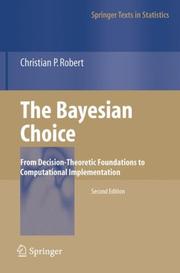
ISBN: 9780387715988 0387715991 0387715983 Year: 2007 Publisher: New York, NY : Springer New York : Imprint: Springer,
Abstract | Keywords | Export | Availability | Bookmark
 Loading...
Loading...Choose an application
- Reference Manager
- EndNote
- RefWorks (Direct export to RefWorks)
Winner of the 2004 DeGroot Prize This paperback edition, a reprint of the 2001 edition, is a graduate-level textbook that introduces Bayesian statistics and decision theory. It covers both the basic ideas of statistical theory, and also some of the more modern and advanced topics of Bayesian statistics such as complete class theorems, the Stein effect, Bayesian model choice, hierarchical and empirical Bayes modeling, Monte Carlo integration including Gibbs sampling, and other MCMC techniques. It was awarded the 2004 DeGroot Prize by the International Society for Bayesian Analysis (ISBA) for setting "a new standard for modern textbooks dealing with Bayesian methods, especially those using MCMC techniques, and that it is a worthy successor to DeGroot's and Berger's earlier texts". Christian P. Robert is Professor of Statistics in the Applied Mathematics Department at the Université Paris Dauphine, and Head of the Statistics Laboratory at the Center for Research in Economics and Statistics (CREST) of the National Institute for Statistics and Economic Studies (INSEE) in Paris. In addition to many papers on Bayesian statistics, simulation methods, and decision theory, he has written four other books, including Monte Carlo Statistical Method (Springer 2004) with George Casella and Bayesian Core (Springer 2007) with Jean-Michel Marin. He has served or is serving as associate editor for the Annals of Statistics, Bayesian Analysis, the Journal of the American Statistical Association, Statistical Science, and Sankhya. and is editor of the Journal of the Royal Statistical Society (Series B) from 2006–2009. He is a fellow of the Institute of Mathematical Statistics, and received the 1995 Young Statistician Award of the Société de Statistique de Paris. Review of the second edition: "The text reads fluently and beautifully throughout, with light, good-humoured touches that warm the reader without being intrusive. There are many examples and exercises, some of which draw out the essence of work of other authors. Only a few displays and equations have numbers attached. This is an extremely fine, exceptional text of the highest quality." (ISI Short Book Reviews).
Bayesian statistical decision theory. --- Statistique bayésienne --- Bayesian statistical decision theory --- Méthode statistique --- Statistical methods --- Aide à la décision --- decision support --- Statistics --- Statistique bayésienne --- EPUB-LIV-FT LIVSTATI SPRINGER-B --- Statistics. --- Statistical decision. --- Probabilities. --- Statistics . --- Probability Theory and Stochastic Processes. --- Statistical Theory and Methods. --- Statistical analysis --- Statistical data --- Statistical science --- Mathematics --- Econometrics --- Probability --- Statistical inference --- Combinations --- Chance --- Least squares --- Mathematical statistics --- Risk --- Statistique mathematique --- Methodes numeriques

ISBN: 9780387759654 9780387759647 0387759646 0387759654 9781441926142 1441926143 Year: 2008 Publisher: New York, NY Springer Science+Business Media, LLC
Abstract | Keywords | Export | Availability | Bookmark
 Loading...
Loading...Choose an application
- Reference Manager
- EndNote
- RefWorks (Direct export to RefWorks)
Although statistical design is one of the oldest branches of statistics, its importance is ever increasing, especially in the face of the data flood that often faces statisticians. It is important to recognize the appropriate design, and to understand how to effectively implement it, being aware that the default settings from a computer package can easily provide an incorrect analysis. The goal of this book is to describe the principles that drive good design, paying attention to both the theoretical background and the problems arising from real experimental situations. Designs are motivated through actual experiments, ranging from the timeless agricultural randomized complete block, to microarray experiments, which naturally lead to split plot designs and balanced incomplete blocks. George Casella is Distinguished Professor in the Department of Statistics at the University of Florida. He is active in many aspects of statistics, having contributed to theoretical statistics in the areas of decision theory and statistical confidence, to environmental statistics, and has more recently concentrated efforts in statistical genomics. He also maintains active research interests in the theory and application of Monte Carlo and other computationally intensive methods. He is listed as an ISI "Highly Cited Researcher." In other capacities, Professor Casella has served as Theory and Methods Editor of the Journal of the American Statistical Association, 1996-1999, Executive Editor of Statistical Science, 2001-2004, and Co-Editor of the Journal of the Royal Statistical Society, Series B, 2009-2012. He has served on the Board of Mathematical Sciences of the National Research Council, 1999-2003, and many committees of both the American Statistical Association and the Institute of Mathematical Statistics. Professor Casella has co-authored five textbooks: Variance Components, 1992; Theory of Point Estimation, Second Edition, 1998; Monte Carlo Statistical Methods, Second Edition, 2004; Statistical Inference, Second Edition, 2001, and Statistical Genomics of Complex Traits, 2007.
Human genetics --- medische genetica --- Zoomorphology. Zooanatomy --- systematische plantkunde --- Statistical science --- genetica --- zoölogie --- statistisch onderzoek --- Plant physiology. Plant biophysics --- morfologie --- Experimental design --- Plan d'expérience --- EPUB-LIV-FT LIVSTATI SPRINGER-B --- Experimental design. --- Mathematical statistics. --- Human genetics. --- Plant genetics. --- Morphology (Animals). --- Statistical Theory and Methods. --- Human Genetics. --- Plant Genetics and Genomics. --- Animal Anatomy / Morphology / Histology. --- Animal morphology --- Animals --- Body form in animals --- Zoology --- Morphology --- Plants --- Genetics --- Heredity, Human --- Human biology --- Physical anthropology --- Mathematics --- Statistical inference --- Statistics, Mathematical --- Statistics --- Probabilities --- Sampling (Statistics) --- Statistical methods --- Statistics . --- Animal anatomy. --- Statistical analysis --- Statistical data --- Econometrics --- Animal anatomy --- Biology --- Physiology --- Anatomy
| Listing 1 - 10 of 33 | << page >> |
Sort by
|

 Search
Search Feedback
Feedback About UniCat
About UniCat  Help
Help News
News